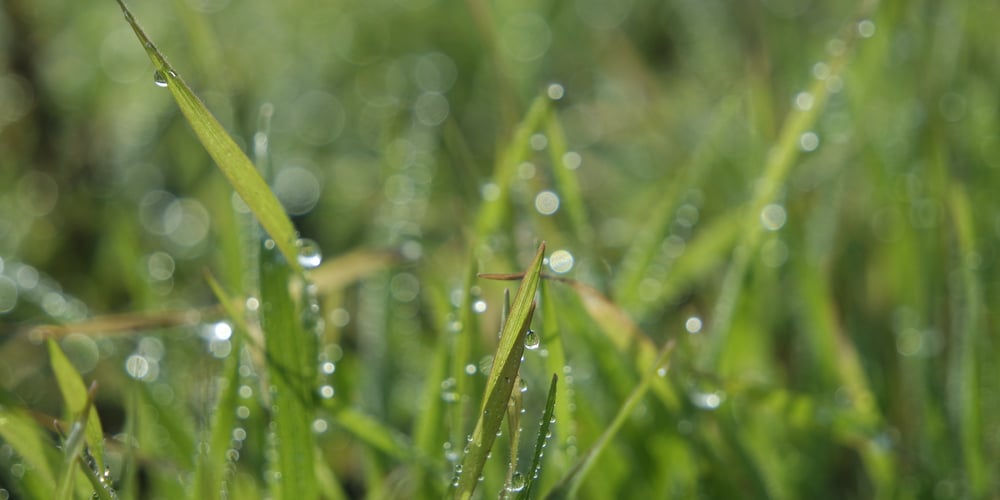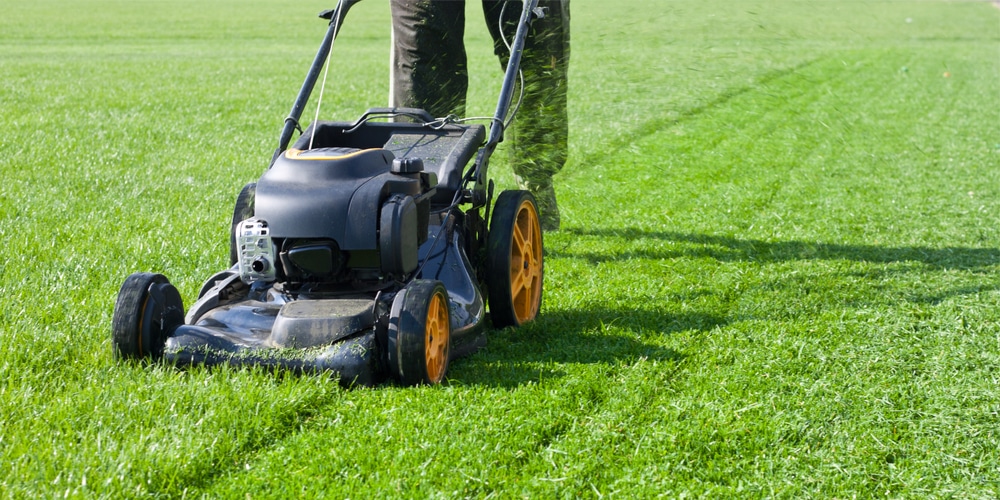You might have heard that mowing in the rain can damage both your lawnmower and your grass. While this might be true, there comes a time we have no choice but to mow a wet lawn. If that is your situation, these six steps can help you minimize any potential damages.
Avoid Mowing Extremely Wet grass

Extremely wet grass tends to mat or lie too low, making it difficult to give your lawn a clean, manicured look. In addition, if the soil is saturated beyond the roots of the grass and your mower wheels keep sliding sideways, you may also create long-term ruts in the lawn. Besides, you also run the risk of spreading plant diseases and compacting the soil. Therefore, after the rain, be patient with an exceedingly soggy lawn and, more importantly, give the wettest areas time to drain.
See Also: Best Mower For Wet Grass
Use a Lawn Mower with Large Moving Wheels
Rainy conditions create a soft ground, which could make your lawnmower sink and get stuck from time to time. This would necessitate moving it back and forth, thus increasing the risk of trampling the greenery with the machine as well as yourself. To overcome this problem, get a larger-wheeled cutter or replace the small wheels of your previous one. This will make your lawnmower exert less pressure on the roots and stems of your growing grass.
Don’t Leave Heavy Clippings on the Lawn
Wet grass falls unevenly over the lawn, creating irregular mulch for the growing grass. This increases the chances of killing some patches of grass when the cut grass is left to rot on the growing grass and makes the lawn slippery and unkempt. Therefore, while mulch mowing is more beneficial and easier, an overgrown lawn and wet grass call for bagging your grass clippings. If you do not have a bagging mower, go the old fashion way and manually rake up the clippings.
Side-discharge your grass
Alternatively, instead of mulching or bagging, you can move your mower deck to a higher setting and set the side discharge in readiness to mow. Typically, your mower may not handle cutting grasses so short in such damp conditions. As a result, clippings and uneven grass may be left behind, but you mow again after it has dried for several days. The idea is to increase the frequency of trimming the grass to prevent it from making your compound shaggy and minimize the possibility of killing some patches of your lawn.
Always Use a Sharp Blade When Mowing
When cutting your grass, friction is required for the blade to produce a straight and clean finish. Water will minimize the grip of the rotating blade, which could rip the grass and leave it susceptible to plant diseases. Therefore, take your time to sharpen the cutter and increase its rotating speed before venturing out to mow in the rain. In addition, you can have periodic pauses to have the blade sharpened again so that you leave nothing to chance. This practice will not only gift you with a well-manicured lawn but also save your mower from excess strain and possible breakdown.
Keep Your Lawn Mower Cleaned
The blessing of a beautiful garden trimmed in the rain will come with the burden of cleaning the lawnmower. Cleaning will be fast and easy if you do it immediately after working on the field and before the clippings cement themselves on the deck. Tilt the mower and project water on the soiled parts to wash the lumps away. Take caution if you are using an electric mower unless you don’t want to live to stare at the nice-looking lawn again. Remember to collect the clippings from the ground to prevent the living grass from choking.
The Bottom Line
Mowing in the rain does not seem the best of ideas. If it can wait, be patient and do it when the water fades away. It only takes about 2 days for grass to completely dry after rain. However, if you have no other option for whatever reason, make sure you heed the call of protecting yourself, the grass, and your mowing machine by following the above guidelines. If there is anything you are not sure about, do not take chances; seek professional advice.
